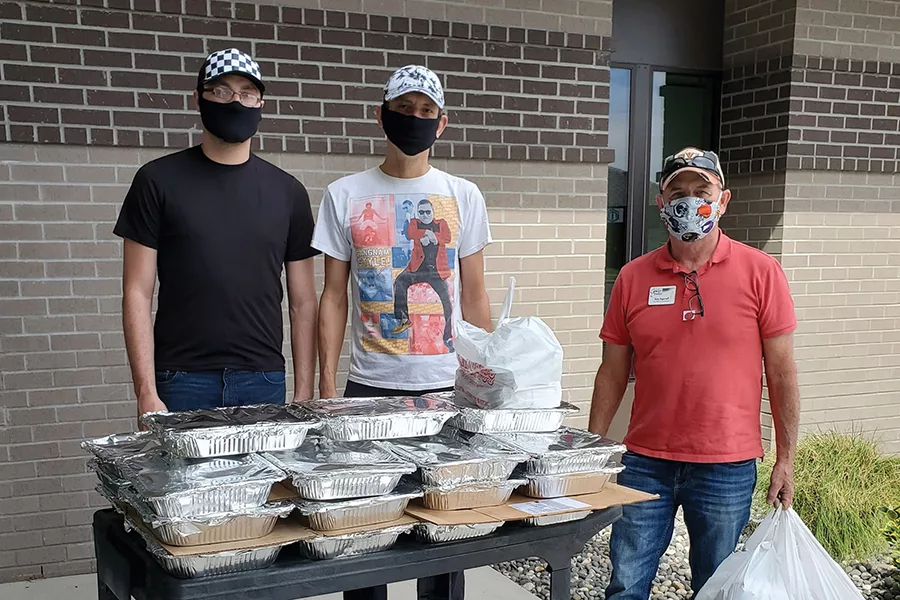
Home » As financial disaster looms, Mid-Columbia nonprofits turn to road trips, drawings and more
As financial disaster looms, Mid-Columbia nonprofits turn to road trips, drawings and more

August 14, 2020
The cancellations spread quickly as Washington and the world shut down over Covid-19 in March.
Breakfasts and lunches, a duck race and a Gatsby-themed gala disappeared from the Mid-Columbia calendar. In-person events that generate badly needed dollars to feed low-income seniors, support cancer patients and more were suddenly too dangerous to go on.
The pain went deep.
Senior Life Resources, which runs Meals on Wheels for seniors, canceled the annual breakfast that helps fill its budget.
The Tri-Cities Cancer Center moved its 20th annual Cancer Crushing Breakfast online. Mid-Columbia Rotary shelved its annual duck race, a first in its 32-year history. The Mid-Columbia Arts Foundation canceled its Gatsby Gala, a tribute to the Roaring ’20s.
Requests for donations followed of course. Three Rivers Community Foundation launched a Covid-19 Emergency Fund. United Way of Benton & Franklin Counties created a Covid-19 Response Fund.
Mid-Columbians responded — generously. 3RCF alone raised $150,000, and United Way raised $263,000.
But the early generosity can’t mask the reality of the Covid-19 pandemic: Up to 40% of the 1.56 million nonprofits in the U.S. will merge or close, according to an influential report, Monitor Institute by Deloitte, released in July.
The Internal Revenue Service identifies 1,756 tax-exempt organizations in the Tri-Cities plus Prosser and Benton City.
Many are inactive, but those that are active are at risk, said LoAnn Ayers, president and chief executive officer of United Way, which raises money and resources for nonprofits through workplace giving and other programs.
“It breaks my heart because the need will still be there,” she said.
Many in-person events became online ones, but Ayers said participation is low.
The Tri-Cities Cancer Center Foundation is one that pivoted, finding a middle path for its second annual Dine Out culinary event. Instead of gathering to sample dishes fashioned from heathy ingredients, participants will hit the road and visit participating restaurants in person on Sept. 12.
But five months after Gov. Jay Inslee issued the Stay Home, Stay Healthy order and as Benton and Franklin counties linger in the most restrictive phase of the restart, donor fatigue is setting in, Ayers said.
She compares 2020 to the summer-long forest fired that choked Northwest skies and inspired countless fundraisers. Donors were eager to help — in the beginning.
“It’s the same thing with Covid,” she said.
But there’s good news too: Nonprofits sharpened their pencils, downsized and found ways to be more efficient. They’re looking for ways to pick up where closed organizations leave off. A client of one is often a client to others.
They’re pooling resources too. A new retirement program that launched in July is a good example.
The Columbia Basin Nonprofit Association hired Petersen Hastings to manage its new collective program. The pooled program brings the buying power of a large group to a collection of small organizations.
“At United Way, it reduces my cost to provide retirement benefits to employees. That’s good for donors and gives employees better options at lower costs,” she said.
Ayers said Tri-Cities is “blessed” to have a continuing federal workforce at the Hanford site and at the Pacific Northwest National Laboratory in Richland, she said.
Unemployment stood at more than 9% in June. Still, most Tri-Citians are working and they have more disposable income because they’re not traveling, dining out or shopping at pre-Covid levels.
“We’re more fortunate than Spokane or Yakima — we had a segment of the community that didn’t lose jobs and have more income,” she said.
Elizabeth McLaughlin, executive director of the Tri-City Cancer Center Foundation, opted not to cancel a new but popular event, Dine Out. The first-ever event was held last year at Walter Clore Wine & Culinary Center in Prosser. Participants dined on dishes prepared by area restaurants and voted for a favorite.
The 2020 version was supposed to be bigger. But the pandemic made it impossible to gather in person. So, it pivoted to the road trip model.
Participants will use an app to direct them to the participating restaurants. They’ll vote on their favorite through the app and collect a Cancer Crushing cookbook at the end.
Proceeds pay to send a healthy family meal home with cancer center patients each Friday. It has raised $40,000 for the nonprofit cancer center and is on track to continue through the end of the year.
“When you give somebody a meal, it’s like a hug when you can’t hug,” McLaughlin said. Tickets are $75 and available through cancercrushingdineout.com.
The cancer center foundation is leading another effort to help nonprofits raise money online.
It wants to legalize online drawings. Washington law doesn’t allow organizations that are licensed to conduct charitable raffles to run them online.
It launched a change.org petition to allow nonprofits to migrate raffles online in light of the pandemic.
“The guidelines for reporting can still be met by allowing this safe and convenient way to continue the vital funding that raffles can bring to many organizations that serve critical purposes in our communities throughout the state,” it says.
Go to bit.ly/TCCancerCenterPetition to learn more.
Those interested in making donations can verify the organizations they want to support at Guidestar and Charity Navigator, online sites that rate nonprofits and post the Form 990s they submit to the IRS.
Local News Charitable Giving & Nonprofits
KEYWORDS august 2020





